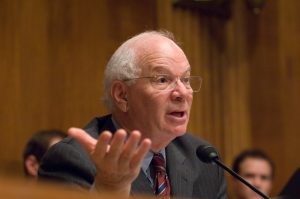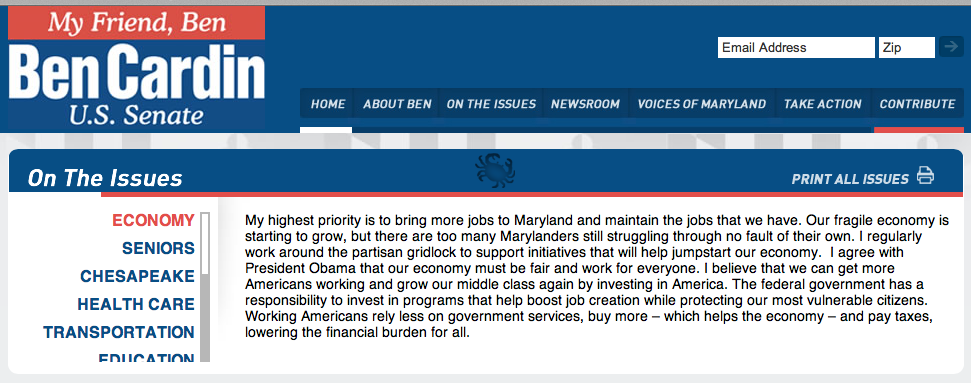
Thursday, September 13, 2012
While the following interview is imaginary, the bold quotes from Senator Cardin constitute, in order, the entire text of his statement on “Economy and Jobs” from his campaign website, www.bencardin.com. A screenshot of his position statement is at the bottom of this article for you to read, in its entirety, without interruption. Clicking on the image will make it larger.
* * * * *
“Hi, Senator. Thank you for stopping by. Please have a seat. …No, I’m.. I’m sitting in this chair. Perhaps you can sit in one of the other ones, in front of my desk. …Good.”
“I know you’re busy. Let’s get right to it. …I think, without question, economic problems – un- and under-employment, the extent of poverty in America, economic growth and related fiscal issues, namely the national debt and deficit spending – these are the most critical issues facing the electorate. With respect to these issues, what will be your highest priority should Marylanders vote to re-elect you?”
“My highest priority is to bring more jobs to Maryland and maintain the jobs that we have.”
“Of course, but can you be more specific?”
“Our fragile economy is starting to grow, but there are too many Marylanders still struggling through no fault of their own.”
“‘Too many Marylanders’? Is there a minimum number of struggling Marylanders you find acceptable? Provided, of course, they’re being unemployed isn’t their fault? And how many unemployed Marylanders should be blaming themselves for their situation, and can’t we do anything to help them? ..In fact, do you even know many Marylanders are unemployed?”
Noticing the squint of confusion on Senator Cardin’s face, I decided to change subjects. “Never mind. Sorry, Senator. I’m afraid I got a bit off track. Tell me what you’re doing to help unemployed Marylanders get back to work.”
“I regularly work around the partisan gridlock to support initiatives that will help jumpstart our economy.”
“‘Regularly?’ But not all the time? ..Never mind. So, what, the gridlock is like a giant fur ball of Republicans and Democrats that you step over to pass recovery legislation all by yourself? Wouldn’t it be easier to workout intelligent compromises with other Senators and the House so that there is no gridlock? There must be reasonable solutions to our problems that you and your colleagues, on both sides of the aisle, can figure out together, aren’t there?”
“I agree with President Obama that our economy must be fair and work for everyone.”
“Of course, but what exactly would you do, for example, to reduce unemployment in Maryland and around the country?”
“I believe that we can get more Americans working and grow our middle class again by investing in America.”
“Sure, but can you be more specific?”
“The federal government has a responsibility to invest in programs that help boost job creation while protecting our most vulnerable citizens.”
“Invest how? How much would you spend? To do what? And how would we fund those investments? We’re already over $16 trillion in debt? Can we afford a second round of stimulus initiatives?”
“Working Americans rely less on government services, buy more – which helps the economy – and pay taxes, lowering the financial burden for all.”
Not wanting to be disrespectful, I nodded my head affirmatively and pretended, for a moment, to be taking notes. “To tell you the truth, Senator, uh, I don’t really have a good, clear idea of what you think we, the government that is, should be doing, …but I see you checking your watch. I suppose it has been an exhausting five minutes that we’ve been talking, and I’m sure you’re busy, what with all that gridlock to need avoid.”
The Senator returned my comments with a perfunctory smile and began pushing up against the arms of his chair. “Maybe you could hone some of the finer points of your economic policies. Put an edge on some of your.. your proposals. Make them razor sharp, not so that you’d cut yourself or anything,” I tried humor, but it didn’t seem to have any effect, “figuratively speaking of course. Maybe be just a tad more precise. Just a tad. Whatever, I’m not sure exactly, but, uh, thanks anyway for stopping by.” And then, not wanting to be impolite, I added, “I can see you’ve spent a lot of time thinking..” but I stopped, feeling somehow that I should be reassuring him, “..a lot of time thinking about all this and, uh, well.. we’ll be okay.”
Less than energized and far from comforted by the Senator’s comments, I stood up to shake his hand and walk him to the door, only to see that he was already on his way out. “Senator Cardin?” He stopped, his hand just short of the doorknob, pausing to admire a picture of my beloved, sad to say late cat, Scooter. “That’s.. That’s the closet, Senator.”
* * * * *
Back to reality. It’s easy enough to make fun of Senator Cardin, of such a pathetically weak position statement on the most important crisis we’re facing, but this is serious business. Unfortunately, statements by his two opponents, Republican Dan Bongino and Independent Rob Sobhani, on their respective websites, are no better. Not really. In fact, there is a widespread failure on the part of both elected and would-be-elected Senators and Representatives to offer specific, well thought out programs to address economic and fiscal problems, or anything else for that matter. I’m not saying we want every incumbent and challenger sounding like Paul Ryan, but the shortage of ideas forthcoming from his counterparts in the House, Senate and White House is discouraging.
Senator Cardin has been in the Senate almost six years and in the House for 20 years before that, and a short regurgitation of party drivel is the best he can do? Either he has no idea what he’s doing, which I think is the case, and/or he has no respect for the ability of the electorate to understand more sophisticated discourse. Either way, the Senator has done and said nothing to justify his re-election.
And yet, he’s likely to win walking, maybe running away. Why? Money. As of the June 30 quarterly FEC (Federal Election Commission) reports, Senator Cardin has used the power of his incumbency to raise a total of, round numbers, $4.6 million, $1.7 million of it from PACs (lobbyists) for who knows what in return. As of June 30, Senator Cardin had $2.1 million on hand – not including the potential for major Democrat Party infusions, if he needs the money. Dan Bongino, the Republican candidate, had raised only $473,000 of which he had $102,000 on hand as of the June 30 report. Independent Rob Sobhani had raised only $227,000 of which he still had approximately $95,000 on hand. Ben Cardin’s campaign has a 20:1 financial advantage over his opponents – in a state where two-thirds of the electorate is registered Democrats. Ben Cardin, the Democrat incumbent, is the default vote. His re-election is almost automatic. Why does he even care what his website says about jobs and the economy?
So what? The so what is that most Marylander voters barely know who Dan Bongino and Rob Sobhani are, nor do they appreciate what difference they would make in the US Senate. The challengers barely have the resources to pay for minimum campaign staff and expenses, and nowhere near enough to mount a 30 day television commercial initiative to counter the blitz coming from Senator Cardin that will leave voters with the impression that he’s God’s gift to government. With only a single debate that relatively few will see, Senator Cardin’s opponents lack the resources, and perhaps even the strategy, to point out Senator Cardin’s deficiencies and draw a sharp distinction between him and what they have to offer.
Maryland voters need to step up, by giving their time, money and at least their support to one of Senator Cardin’s opponents, or give up the right to complain about the ineffectiveness of their government.
-Next Contestant


